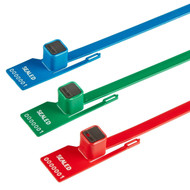3 Must-Have Security Seals for Inspectors
Posted by Steve Diebold
Inspectors must ensure that they have the necessary security seals to protect the integrity of their work and for the safety of the public. Proper security seals are crucial for inspectors. These seals ensure that inspected areas remain unaltered until the next visit, allowing for accurate comparisons and confident assessments.
Without these seals, there is a risk of tampering or unauthorized access, which could compromise the accuracy of their findings. By using security seals, inspectors can uphold the trust and credibility of their work while also prioritizing public safety.
1. Tamper Evident Seal
Tamper evident seals are commonly used for inspections of the following items: elevators, business scales, meters, time clocks, alarm systems, medical equipment, food handling devices, water and sewage treatment systems, and fire suppression systems. Here, the inspector can include details such as the date or type of inspection, the device's state, the next inspection date, etc., while also identifying themselves as the responsible party.
Similar inspection methods employ tamper evident seals in numerous locations worldwide such as: our food supply, medical treatment, energy, transportation infrastructure, power, and water all depend on quality, performance, or purity inspections. For example, a food handling device may undergo a routine inspection where the inspector notes any maintenance issues, cleanliness levels, and compliance with food safety regulations. The inspector then attaches a tamper evident seal to signify that the device has been inspected and approved for use until the next inspection date.
We often fail to appreciate the importance of skilled and licensed inspectors, whose job it is to ensure the continued operation and safety of these commonplace aspects of our lives. The tamper evident seal ensures that the inspector has followed all necessary safety protocols during the inspection. This provides confidence that the inspected objects are secure, allowing operations to proceed uninterrupted.
2. Custom Seals
Another important type of security seal are the custom security seals with their organization's logo or name to further enhance security and prevent counterfeit seals from being used. Inspectors can specifically design custom seals to meet their needs, offering a secure and reliable method for tracking and identifying seals used during inspections. These custom seals can help maintain a chain of custody and prevent unauthorized access to inspected areas.
Inspectors are diligently checking and validating their results, but they require a variety of seals to suit their purpose. There are several tamper-indicating devices available such as mechanical seals, security labels, ink stamps, pressed seals, printed tags, and more. There is a seemingly endless array of sealing and marking techniques, each with its own unique usage in various industries. The wide range of sealing and marking techniques available gives inspectors a diverse set of tools to effectively secure and protect their inspections in various industries.
If you are confused about what seal to get, don't worry; AC&M has been making seals for almost every business and industry for more than a century. Inspectors frequently rely on individualized branding or bespoke seals, and AC&M excels at providing both. We have effective sealing options for all of those difficult operations, whether it's color labeling, bespoke marking, or blank labels for notes.
3. Numbered Seals
Inspectors should consider numbered seals, which allow inspectors to easily track and identify each seal used during an inspection. This helps to maintain a chain of custody and ensures that no unauthorized individuals have accessed the inspected area.
Numbered seals on inspectors' work serve a variety of important purposes. Firstly, they guarantee safety by ensuring that equipment such as elevators and fire extinguishers have not undergone tampering since the last inspection. Secondly, they offer a record-keeping system that enables inspectors to monitor the last time and person who inspected a piece of equipment. Finally, they deter tampering, discouraging anyone from compromising the equipment's integrity in the inspector's absence.
Likewise, numbered seals on utility meters and building valves function similarly. They prevent unauthorized access to the gas, water, or electrical systems, potentially safeguarding against leaks or malfunctions. Numbers on meter seals also act as a record, indicating the date of the last inspection and the inspector responsible. Most importantly, they serve as a deterrent to tampering, serving as a reminder to everyone that the inspector verified the integrity of the system.
Protect Your Equipment Integrity: Take Action Against Tampering Today!
It would take a book to get into all the specifics of the inspectors' job and how it affected us all. In fact, the importance of their role transcends specific details. Rest assured, these individuals dedicate themselves to ensuring our collective safety.
However, if you're an inspector interested in learning more about how American Casting & Manufacturing seals can assist you in your work, please get in touch with us. We value inspectors' hard work and dedication to ensuring the safety and integrity of equipment. Moreover, AC&M seals have been a reliable tool for decades and can provide an extra layer of security and peace of mind for both inspectors and equipment owners.
Feel free to contact our team of knowledgeable specialists via email, phone, or live chat at any time during 8:00 a.m. to 5:00 p.m., EST. Alternatively, you can access all the information you need and place a seal order at any time, day or night, using our website.

